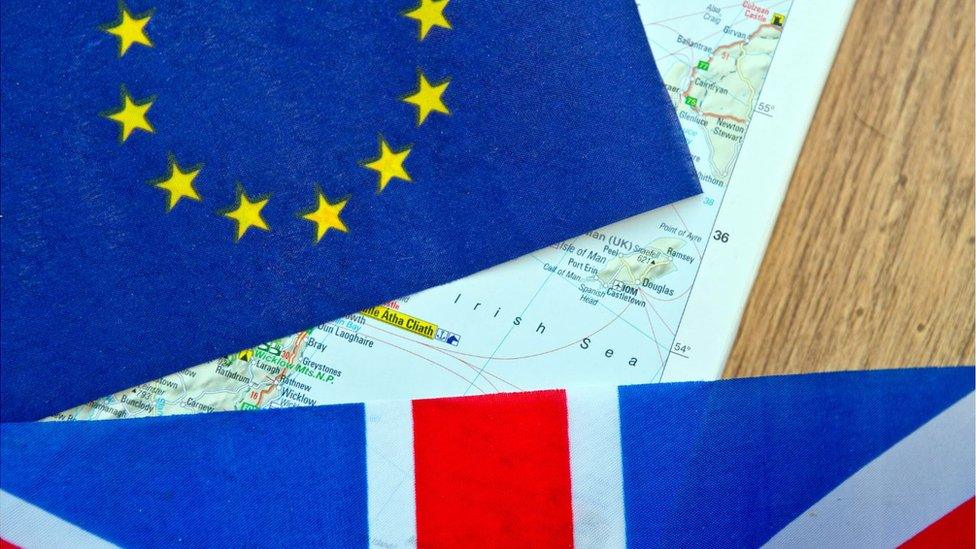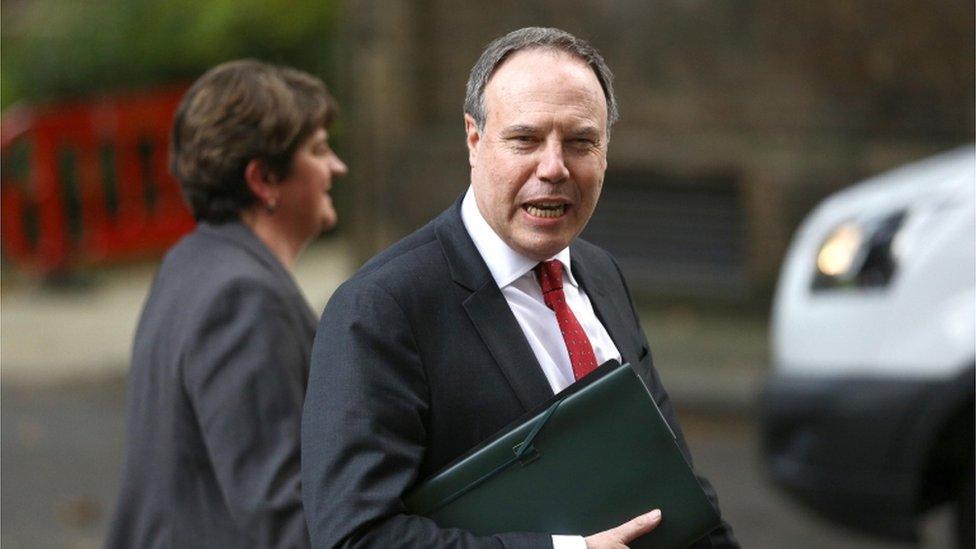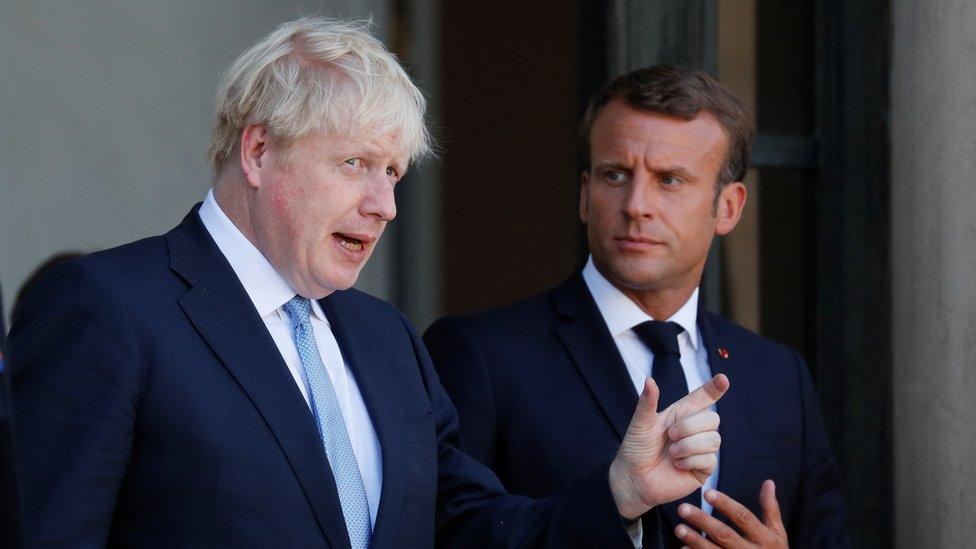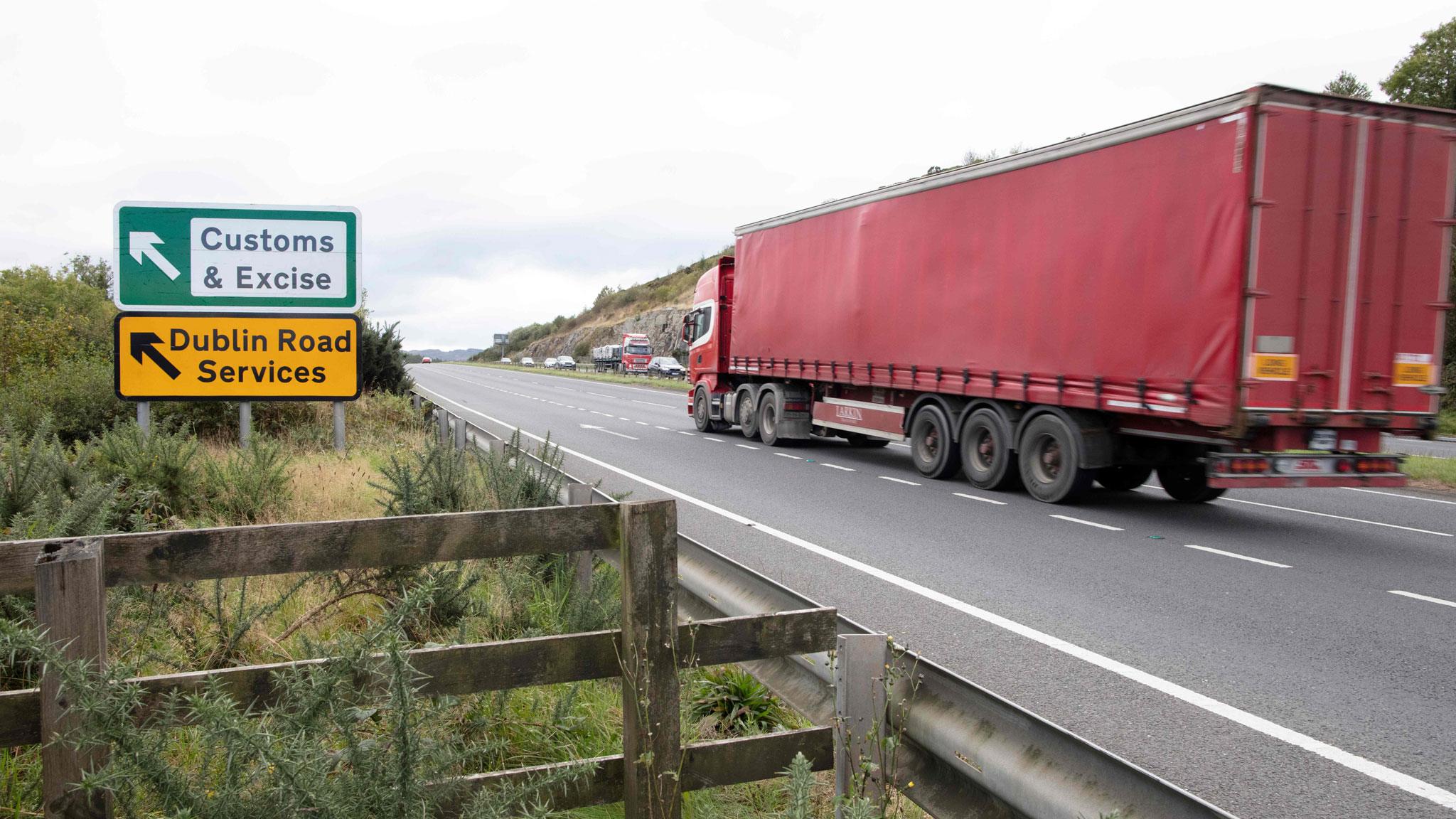Brexit: DUP under pressure over 'blood red line' U-turn
- Published

Previously DUP representatives ruled out any economic border down the middle of the Irish Sea
EU chiefs and the Irish government don't think Boris Johnson has moved far enough to ensure no hard border in Ireland after Brexit.
However, back in Northern Ireland the Democratic Unionist Party (DUP) is coming under pressure from other unionists for performing a U-turn on its previously declared "blood red line"., external
On countless occasions over the past three years, DUP representatives ruled out any economic border down the middle of the Irish Sea.
Although many business groups in Northern Ireland favour alignment with EU trade rules in order to smooth the passage of north-south trade, unionists fear this could be a constitutional "thin end of the wedge".
Their concern is that a regulatory border would make business with firms in Great Britain less straightforward, deprive Northern Ireland of the benefits of any post-Brexit trade deals which Westminster might strike, and slowly, but surely, make life and commerce in Belfast feel more like Dublin and less like London.
On the night of the publication of Prime Minister Boris Johnson's offer, I put those concerns directly to DUP deputy leader Nigel Dodds.
I quoted the North Belfast MP's previous comments from December 2017 back to him.
At the time, Mr Dodds declared the DUP would "not allow any settlement to be agreed which causes a divergence politically or economically of Northern Ireland from rest of UK because to do so… would be catastrophic for everyone in Northern Ireland".
But last week the DUP deputy leader told me not to fall for "propaganda".
He argued "the reality is that can only be done if unionists in the assembly agree to it and that decision would only be made at the end of the transition period".

Mr Dodds has previously said any divergence from the UK would be catastrophic for NI
"The reality is there is nothing agreed on that aspect at all," he said.
"We remain absolutely wedded to the view that the economic and constitutional integrity of the UK is sacrosanct."
He described the proposed Stormont lock on aligning trade rules with the EU as a " massive safeguard" and claimed there had been "no change whatsoever" in the DUP's approach.
Other unionists don't buy that.
Unionist criticism
Former Ulster Unionist leader Lord Empey labelled the Johnson offer a "ghastly deal" lampooning the DUP leader as "Arlene 'Two Borders' Foster".
Lord Empey's former colleague Jeffrey Donaldson, who defected to the DUP back in 2004, accused the UUP politician of still harbouring a sense of bitterness from battles he had fought and lost with the DUP 15 years ago.
The Ulster Unionists aren't alone - the pro-Brexit Traditional Unionists are also vocal in their criticism.
Their leader, former DUP MEP Jim Allister, accused his old party of "furiously trying to divert attention from their climbdown".
DUP leader Arlene Foster feels aggrieved.
No doubt, she expected criticism from rival unionists who her party may soon have to face in a general election.
But she perhaps hoped for more "covering fire" from business and agricultural interests, who had previously pressurised the DUP to shift their opposition to regulatory alignment with the EU.

TUV leader Jim Allister has been vocal in his opposition to his former party
Last month many thought the most the DUP might contemplate would be Northern Ireland dovetailing its rules with the EU when it came to food and agriculture, where different rules from the Irish Republic would be particularly hard to manage.
Instead the Johnson offer is far more comprehensive - embracing alignment on standards covering all manufactured goods.
However so far local business representatives haven't applauded this as a sign of flexibility.
lnstead, they focussed on the complexities of two borders - one for customs, the other for trade regulations - and the potentially disruptive impact of Stormont voting on the EU rules every four years on firms' ability to make long-term plans.
So the DUP hasn't won many plaudits, which explains Mrs Foster's exasperated comment to the Belfast Telegraph, external when she said "it's true that you're never a prophet in your own land, but the coverage has been ridiculous".
The argument over whether the DUP has performed a U-turn and is now - to quote the News Letter's political editor Sam McBride - trying to take some of its own Brexiteer voters for fools is likely to be played out whenever rival unionist candidates take to the campaign trail in the forthcoming general election.
Confused by Brexit jargon? Reality Check unpacks the basics.
One aspect of the Johnson proposals which the DUP will, no doubt, have to keep a beady eye on is the precise status of the veto over Northern Ireland's trading regime which they believe they have negotiated.
Amid complaints a minority has been given the whip hand over majority opinion in Northern Ireland, Mr Johnson last week indicated he was willing to look again at the "mechanism of consent".
Speaking to the BBC's Andrew Marr, Brexit Secretary Steve Barclay echoed this, saying the principle of consent was key but added "we can obviously as part of the intense negotiations in the coming days discuss that mechanism.", external
If the Stormont Assembly doesn't return to life, Mrs Foster suggested to the Belfast Telegraph that EU trade rules could be dealt with by a Westminster-based Northern Ireland Grand Committee.
This would almost certainly be even more unpalatable to nationalists and the Irish government than the proposed Stormont lock.
The nightmare, from the DUP's perspective, would be if, having conceded on the principle of aligning with the EU, the mechanism of consent agreed by the UK did not deliver a unionist veto.
It seems highly unlikely Mr Johnson could contemplate such a move in the next few weeks, while he remains heavily dependent on DUP support at Westminster.
But it's one to watch should the Johnson proposals still be in play on the other side of a general election.
- Published13 December 2020

- Published7 October 2019

- Published2 October 2019

